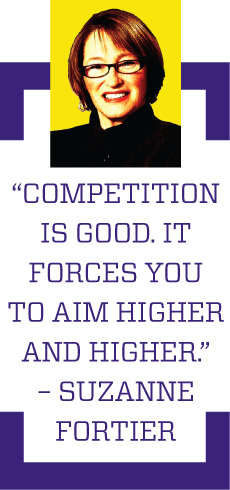Northern Ambition
A Canadian pursues top talent in the United States and abroad.
BY PIERRE HOME-DOUGLAS
As a crystallographer, Suzanne Fortier got used to viewing the world a little differently from most, examining matter at the atomic and molecular level to understand its underlying structure. But nowadays, she looks out from Ottawa across the global scientific landscape. As head of the Natural Sciences and Engineering Research Council, Canada’s equivalent of the U.S. National Science Foundation, she’s intent on luring the world’s best scientists and engineers to spur Canadian innovation.
Competition for talent is tough, but Fortier learned about high-stakes science from a master. After earning her Ph.D. from McGill University in 1976, she did a postdoc at the Medical Foundation of Buffalo – now the Hauptman-Woodward Medical Research Institute. There, she worked under Herbert Hauptman, who would go on to share the 1985 Nobel Prize in chemistry. It was one of her career’s highlights. Their research used probability theory to develop methodologies for solving crystal structures. While inspired by Hauptman’s appreciation for the beauty and harmony of mathematical equations, she recalls, “the work was leading edge, and the community in the field was international and highly competitive. It was great to learn early on that competition is good. It forces you to aim higher and higher.”
Canada’s outreach has been growing for more than a decade. In 2000, it set up 2,000 research professorships at Canadian universities. Roughly a third were filled by people from outside Canada, including 18 percent from the United States. Since Fortier became president of NSERC, the country has established the Vanier Canada Graduate Scholarship – $50,000 a year tax free for three years at a Canadian university – and the Banting Scholarship for postdoctoral researchers, named after Frederick Banting, the Canadian who discovered insulin.
Unlike NSF, NSERC does not get involved in social science, K-12 education, or providing money for laboratories and equipment. Its focus is threefold, Fortier says: people, “investing in talent, both research chairs, fellowships and scholarships for students”; discovery, “unleashing all the creative power in our researchers and students”; and innovation, “linking all of our talent and discoveries to the benefit of our industrial society.”
Whereas U.S. research agencies are sometimes at pains to justify funding research with obvious commercial applications, NSERC spends a full third of its $1.1 billion budget forging partnerships between industry and academia. It hopes to double the number of companies involved in its research partnership programs with universities to 3,000 in the next five years. Recently NSERC started promoting what Fortier calls a “first date” – relatively short-term R&D collaborations between entrepreneurs and university-based researchers. To aid the process, NSERC has cut the wait time for grant decisions to five weeks. “Companies have no time and money to waste,” Fortier says. “We have to increase our agility and flexibility without compromising on the rigorous processes to make sure that we make good investments.”
Fortier, 62, says she was drawn to science by inspiring teachers in high school. She was introduced to her chosen field at a 1968 science fair. “I did a project on diffraction of sound waves. One of the judges at the fair said, ‘If this is of interest to you, come by my crystallography lab at McGill University.’ I did and found it absolutely fascinating.” She was the first in her family to earn a university degree. After her postdoc, she joined the chemistry department at Queen’s University in Kingston, Ontario, moving later into administration. The word “administrator” doesn’t convey what it takes to guide and empower researchers so they can realize their dreams, she says. “Motivator” says it better.
If part of her current job is to motivate bright researchers to immigrate, the outgoing, personable Fortier does so with a salesman’s flair. Canada, she says, is not just a great place to live, but “a country of opportunities, where talent, commitment, and hard work are the ingredients needed for success.”
Pierre Home-Douglas is a freelance writer based in Montreal.
Category: Up Close
